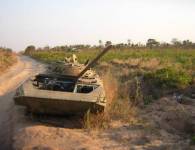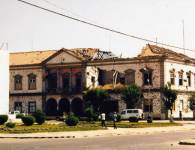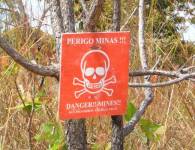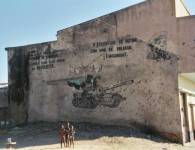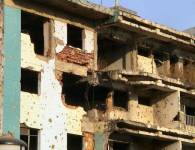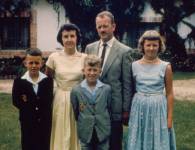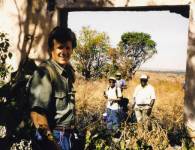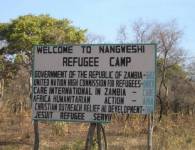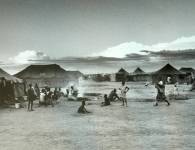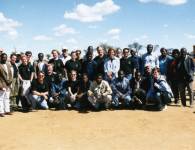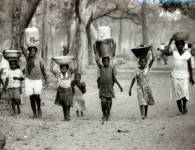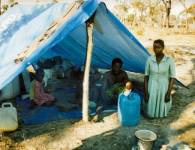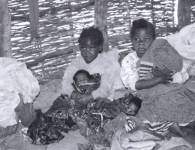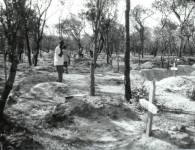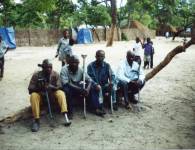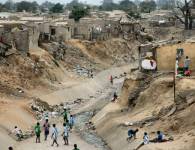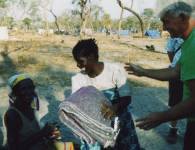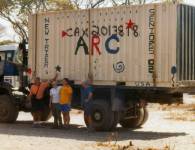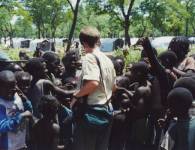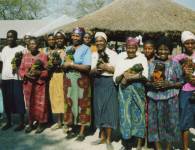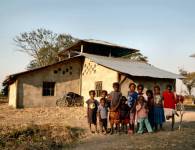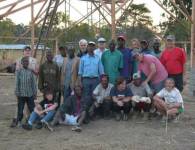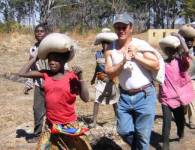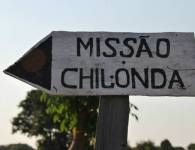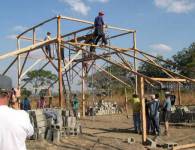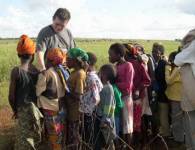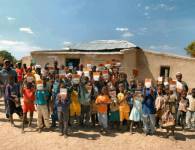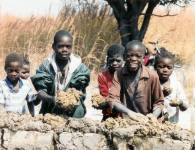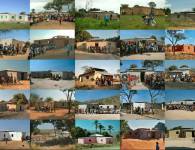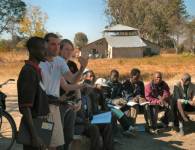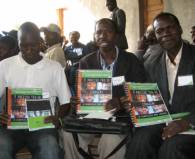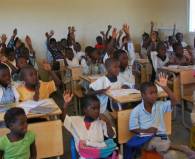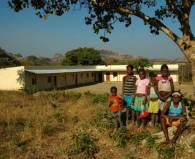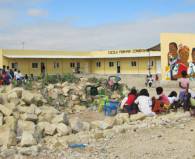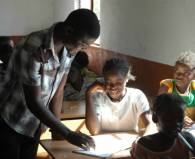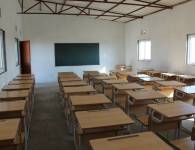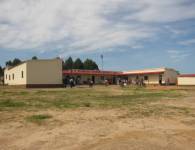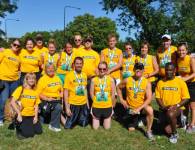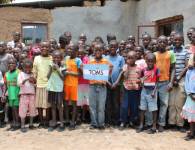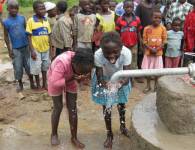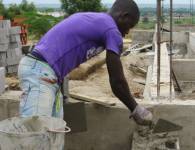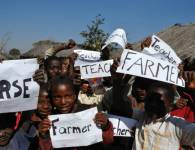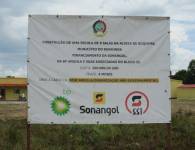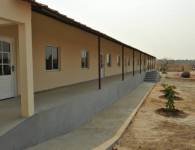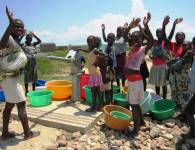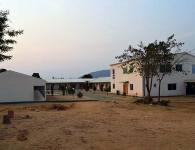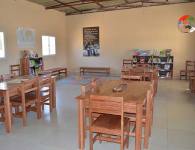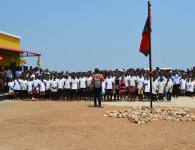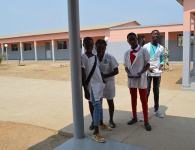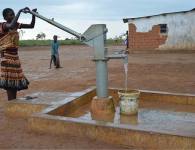about
RISE International is a 501(c)(3) non-profit organization based in Northfield, IL, USA.
Originally founded as the African Refugee Committee (ARC) in 2001, ARC brought relief, development and support to refugees of the 27 year Angolan civil war, both in Namibia and Zambia. When the war ended in 2002, an entire generation was left unable to read and write – RISE committed to help rebuild Angola, building primary schools in rural areas.
We believe every child has the right to education.
While the Angolan Ministry of Education concentrated their efforts primarily in urban areas, RISE focused on bringing the opportunity for education to children in remote, nearly inaccessible regions of the country. Since 2003, RISE has built 196 schools, with several under construction, and over 142,000 students having access to education each year. Our model works – it is collaborative, scalable and has a proven track record of success.
RISE International grants funds raised to RISE Angola, based in Benguela, Angola.
RISE Angola is a non-governmental organization registered in Angola and certified by IPROCAC (Institute for Community Aid Promotion and Coordination), who oversees the work of NGOs in Angola. RISE Angola is our implementing partner with direct responsibility and oversight of projects and programs.
the RISE timeline
1975 – End of Portuguese Rule / Civil War
After almost 500 years of Portuguese rule, Angola was granted its independence and the transition was entrusted to the three main liberation movements, MPLA, UNITA and FLNA. The transitional government was inaugurated on January 31, 1975, but within days differences between groups led to tension in the government. Serious fighting broke out in the streets of the capital city of Luanda and is seen as the start of the Angolan Civil War which would last over 27 years.
After leaving Angola in 1966, Dr. Andrew Cole and Pastor Don Cole returned to Angola in 1997 during a brief window of peace, where Don and his wife Naomi had served as missionaries for 18 years. They witnessed the destruction of the war first-hand and were stirred to help the people they knew and loved. Following two more trips in 1998, entry into Angola was blocked as the war escalated, and Andrew along with his wife Lynn, traveled to Namibia in 1999 in search of Angolans living in United Nations refugee camps. They would return to the Osire Refugee Camp with a team in May of 2000 to bring humanitarian relief and support to Angolan refugees, and began work in the Nangweshi Refugee Camp in Zambia as well.
2001 – African Refugee Committee
The Civil War created a humanitarian disaster in Angola. Over 4 million people (a third of the population) were displaced and living in substandard conditions both within the country and in refugee camps in the Democratic Republic of Congo, Zambia, Namibia and Botswana. With little or no access to medical care, water and food, the average life expectancy was less than 40 years of age. In 2001, the African Refugee Committee was formally established with the mission to provide relief, development and community care for Angolans living in refugee camps at Osire in Namibia and Nangweshi in Zambia.
2002 – End of Angolan Civil War
After the death of Jonas Savimbi on February 22, 2002, the MPLA and UNITA agreed to a cease fire which marked the end of the Civil War. Refugees began to repatriate, many going to the capital city of Luanda instead of returning to the area of their origin. Despite the harsh conditions of Luanda, it was often preferable to returning to the countryside where there were few jobs and poor infrastructure, no healthcare services, clean water, sanitation or schools. Involvement continued in the refugee camps with bi-annual team visits, teacher/leader training, a doll project, shipping of containers and a drive providing 9,000 blankets to refugees.
The Angolan government focused its efforts on the development of schools in urban areas, and people in the countryside had little or no access to education. While continuing to provide relief to Angolans still living in refugee camps, the African Refugee Committee changed its name to RISE International, and embraced a plan to help rebuild Angola through education, building primary schools in rural areas. The first RISE school was built in the village of Chilonda, fulfilling Andrew Cole’s dream of building a school in his boyhood home.
2004-2006 – Change in Leadership, Continued Focus
With the unexpected death of Andrew Cole, his wife Lynn was named Executive Director of RISE, and the work of the organization continued. Within the first year, 5 schools were funded by RISE and over 1,700 students were learning in RISE schools. Relief trips to the refugee camps shifted as Angolans returned to their home country, and focused on training for teachers and leaders in areas where RISE schools were being constructed in Angola. The building of both schools and relationships continued.
To address efficiency and functionality of schools, RISE constructed the first school utilizing a new design in the village of Kavimbi. RISE had funded and constructed over 100 original design schools which gave over 45,000 students the chance to learn in rural areas of Angola. In addition, the organization continued to provide supplemental community development initiatives which included training for teachers and leaders, as well as a life skills and AIDS prevention curriculum. Containers of school supplies and clothing were shipped.
2010-2012 – Broadening the Impact
Twelve years after the first trip to the refugee camps, RISE had built over 145 schools where over 90,000 students were learning. Individuals, small groups, churches, businesses and schools continued to raise funds to impact thousands of children. Eleven wells were drilled at school sites, RISE became a TOMS Shoes giving partner and strategic partnerships in Angola were pursued. Team RISE, which began in 2009, provided the opportunity for over 5,000 children to go to school in 4 years.
The Power of 10 campaign marked 10 years of building schools in rural Angola. Jobs have been created for RISE Angola leadership, building teams, principals and teachers. Two additional wells were drilled, more TOMS shoes were distributed, strategic partnerships in Angola funded schools, and now over 100,000 children have been impacted only because RISE built a school in their village. The results are significant, but a huge need remains as it is estimated that 4 million children have no opportunity to go to school.
2015-2017 – Every child should have the chance to go to school
2017-2020 – 24,000 MORE kids in school
RISE built 26 schools to give 24,000 MORE children access to education, through a matching co-funding partnership with Educate A Child and ExxonMobil. The project involved several key components, above all giving 24,000 MORE children the chance to go to school; building approximately 25 schools to accommodate those students; and Monitoring and Evaluation, tracking the enrollment, attendance and retention of the 24,000 individual students. Our fundraising goal was met, the schools are finished, and will be open with students enrolled once it is determined safe, given pandemic restrictions countrywide.
As a result of the COVID-19 pandemic, schools in Angola were closed in March 2020. Children have again been at a disadvantage. Without computers, internet, and electricity, remote learning is not an option – those who were attending missed most of the 2020 academic year, February through November. Schools reopened in February 2021.
Thousands more long for education, more schools are needed to provide access, and building moves forward. Schools at Bolonguera and Kwawa were dedicated amidst much joy and celebration. Two schools were completed and dedicated, 11th of November and Cabaia, funded by BP Angola, a valued, strategic partner since 2012 with a long history of social commitment to the most needy communities in Angola. Funds were raised for a school at Bairro Novo and construction began immediately!
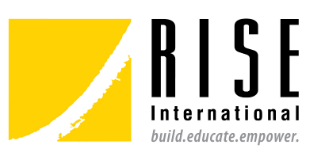 RISE International
RISE International






